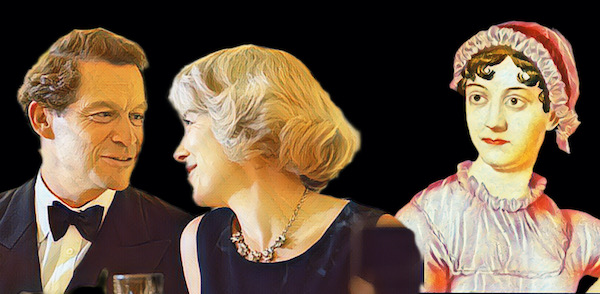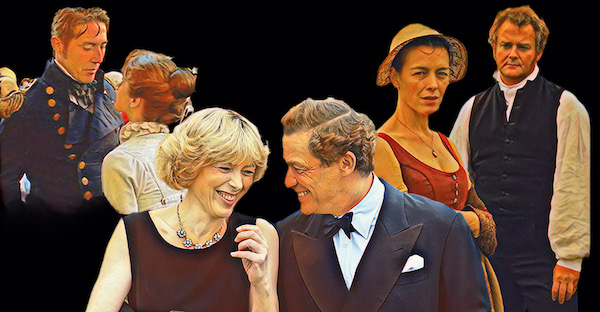In the sixth season of The Crown, reliving Queen Camilla‘s 50th birthday, the series featured King Charles, then a prince, making a public declaration of love to his girlfriend, and, in particular, quoting some of the world’s most romantic novels written by the brilliant Jane Austen. Anyone who is a Jane groupie like I am, especially her latest (and most beautiful) book, Persuasion, was moved before he even started. It is not known whether Charles actually made the quote, but the parallel with the work is perfect.
I have loved none but you.
Captain Wentworth in Persuasion, by Jane Austen
Although Jane’s most famous book is Pride and Prejudice, and Emma‘s popularity also puts her other works in the background, there is a great force among the author’s admirers to choose the book that was only published posthumously as her best. I think.
Persuasion maintains the tradition of a heroine without apparent physical beauty, of a caring woman dedicated to her family and friends, as well as a woman who follows the rules of morals and feminine restrictions, but, unlike the previous ones, Anne Elliot resents having done make the wrong choice and condemn yourself to a lonely, hopeless life. This perennial, resigned and romantic sadness makes her a passionate woman who is considered ‘old’ at 27 years old. As I wrote before, 30 in Jane Austen‘s time was 50 today, with the same weight of ageism. In the book, when she was just 19 years old, Anne met Captain Frederick Wentworth, still without titles or fortunes, and is persuaded by her mentor not to accept his marriage proposal – even though the two were in love – in order to have a more stable and supportive union. her level with another man, one she could still meet. Obediently, Anne goes against her heart and breaks up with her boyfriend, breaking his heart irreparably. Years pass and she not only doesn’t find anyone – in fact, she refuses anyone else – and when she and her ex meet again he is rich and she is poor, but, to make matters worse, “old”. Wentworth subtly humiliates her by being cold, although we see from the book that there is hope between them. Pressured to get married, he chooses the beautiful, young, and futile Louisa Musgrove as his suitor, leaving Anne even sad because she likes the girl and has to witness their flirtation in silence. An accident almost takes Louisa’s life and providentially brings another man into the young woman’s life, surprising Anne. Upon hearing a male critique of Louisa’s vulnerability, Anne defends her, explaining that “love longest even when all hope is gone.” Upon hearing these words, Wentworth writes the most beautiful declaration of love in literature, explaining to Anne that he never stopped loving her. The two get back together, get married, and live happily ever after.

I rushed to the conclusion because I can talk about the beauty of the book forever, but I want to mention the connections with The Crown. First, the love triangle reflects what Charles, Diana, and Camilla experienced. Charles was persuaded not to fight for Camilla, married the young Diana, and never stopped loving his current wife, creating sentimental and political chaos in the Royal Family. And comparing Diana to Louisa is not wrong, as both were passionate and young, but they were not perfect for Wentworth, who had affection for her, but was not in love. Therefore, when he reaches middle age, Charles decides to fight for his happiness and as we know, he doesn’t give up his true love for anything. Nor public opinion.
The letter says:
I can listen no longer in silence. I must speak to you by such means as are within my reach. You pierce my soul. I am half agony, half hope. Tell me not that I am too late, that such precious feelings are gone for ever. I offer myself to you again with a heart even more your own than when you almost broke it, eight years and a half ago. Dare not say that man forgets sooner than woman, that his love has an earlier death. I have loved none but you. Unjust I may have been, weak and resentful I have been, but never inconstant. You alone have brought me to Bath. For you alone, I think and plan. Have you not seen this? Can you fail to have understood my wishes? I had not waited even these ten days, could I have read your feelings, as I think you must have penetrated mine. I can hardly write. I am every instant hearing something which overpowers me. You sink your voice, but I can distinguish the tones of that voice when they would be lost on others. Too good, too excellent creature! You do us justice, indeed. You do believe that there is true attachment and constancy among men. Believe it to be most fervent, most undeviating, in
F. W.
I must go, uncertain of my fate; but I shall return hither, or follow your party, as soon as possible. A word, a look, will be enough to decide whether I enter your father’s house this evening or never.
Does anyone still have dry eyes?
Let’s now look at other interesting parallels in The Crown. It is a fact that Queen Elizabeth II, although not helping Princess Diana, opposed Camilla for decades, even after her son’s divorce. They claim that those close to her even called her “that dreadful woman”, but little by little, she recognized that Charles didn’t want anything else and granted her blessing, ending her days close to her daughter-in-law, now the Queen of England. It was not without time. Duty to the Crown versus true love was the reason why Elizabeth came to the throne, as her uncle was the heir and gave up everything for Wallis Simpson. Soon afterward, Elizabeth’s sister, Margaret, was persuaded to give up her first love, a divorced man, so as not to interfere with the monarchy. Margareth was never 100% happy romantically and the shadow of doubt as to whether she made the right choice persisted, so much so that in The Crown she gained prominence in every season. Having Margareth at the party and calling Elizabeth, defending Camilla and Charles, is closing a cycle with a flourish. We don’t know if it was true, but Peter Morgan’s imagination shows his ability to tell how beautiful love stories intersect.

And while we’re on the subject of crossover, it’s also poetically beautiful that it’s actress Olivia Williams who is playing Camilla in The Crown when this letter is read. Is that because the BBC made a BEAUTIFUL and UNMISSABLE film in the 1990s about Jane Austen when she was writing Persuasion and who played the writer? That’s right, Olivia. Miss Austen Regrets isn’t easy to find, but it’s worth the search. It contextualizes a Jane who, although she knew how to write about love like few others, never lived a great romance publicly and could have possibly, and briefly, regretted it.
If you understand English, I also recommend listening to Cynthia Erivo‘s reading of the book. And keep the Kleenex nearby. Who warns, a friend is.
Descubra mais sobre
Assine para receber nossas notícias mais recentes por e-mail.
